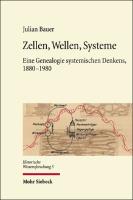Zellen, Wellen, Systeme
Eine Genealogie systemischen Denkens, 1880–1980
Author(s)
Vuorimäki, Julian
Collection
Knowledge Unlatched (KU)Number
101761Language
GermanAbstract
The history of systems theory does not start with the rise of cybernetics in the post-war 20th century. It rather took off in the late 19th century's now largely forgotten organismic sociology. Authors like Talcott Parsons or Niklas Luhmann can't, however, be reduced solely to a single line of descent. Julian Bauer outlines the plural origins of systemic ideas by portraying their broad foundation in different strands of holist thinking and thus provincialises systems theory. His book charts the intellectual and visual culture of systems thinking between 1880 and 1980.


 Download
Download Web Shop
Web Shop